Search the Special Collections and Archives Portal
Search Results
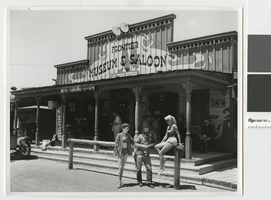
Photograph of people near the entrance of the museum and saloon at Last Frontier Village, 1950s
Date
Archival Collection
Description
Entrance to the museum and saloon in Last Frontier Village, a theme park at the Hotel Last Frontier
Site Name: Frontier
Address: 3120 Las Vegas Boulevard South
Image
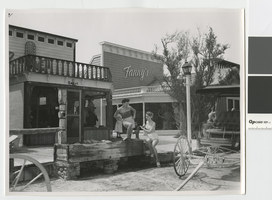
Photograph of two women near Fanny's Dress Shop at Last Frontier Village, 1950s
Date
Archival Collection
Description
View of Fanny's Dress Shop in Last Frontier Village, a theme park at the Hotel Last Frontier.
Site Name: Frontier
Address: 3120 Las Vegas Boulevard South
Image
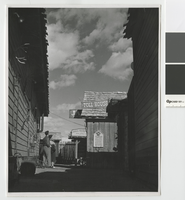
Photograph of tourist attractions at Last Frontier Village, 1950s
Date
Archival Collection
Description
View of various tourist attractions, including a toll house, jail and justice building at Last Frontier Village, a theme park at the Hotel Last Frontier.
Site Name: Frontier
Address: 3120 Las Vegas Boulevard South
Image
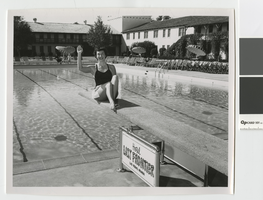
Photograph of Florence Chadwick sitting on the diving board at the swimming pool of the Hotel Last Frontier, 1950s
Date
Archival Collection
Description
Florence Chadwick, the first American woman to swim the English Channel both directions, at the swimming pool of the Hotel Last Frontier.
Site Name: Frontier
Address: 3120 Las Vegas Boulevard South
Image
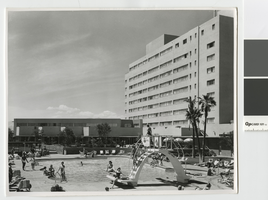
Photograph of guests at the Riviera Hotel swimming pool (Las Vegas), after 1955
Date
Archival Collection
Description
Guests in the courtyard and pool area of the Riviera Hotel.
Site Name: Riviera Hotel and Casino
Address: 2901 Las Vegas Boulevard South
Image
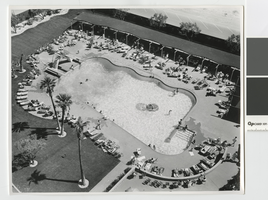
Aerial photograph of guests at the Riviera Hotel swimming pool (Las Vegas), after 1955
Date
Archival Collection
Description
Overhead view of guests in the courtyard and pool area of the Riviera Hotel.
Site Name: Riviera Hotel and Casino
Address: 2901 Las Vegas Boulevard South
Image
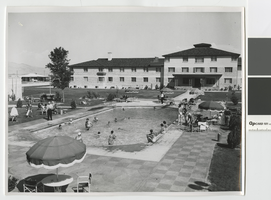
Photograph of guests at the Thunderbird Hotel swimming pool (Las Vegas), circa 1950s
Date
Archival Collection
Description
Guests in the courtyard and swimming pool area of the Thunderbird Hotel.
Site Name: Thunderbird Hotel
Address: 2755 Las Vegas Boulevard South
Image
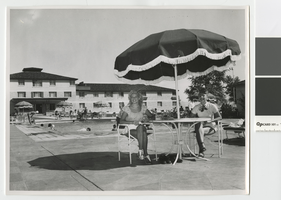
Photograph of two women at a table in the courtyard of the Thunderbird Hotel (Las Vegas), circa 1950s
Date
Archival Collection
Description
Two women sitting at a table in the courtyard of the Thunderbird Hotel, near the swimming pool.
Site Name: Thunderbird Hotel
Address: 2755 Las Vegas Boulevard South
Image
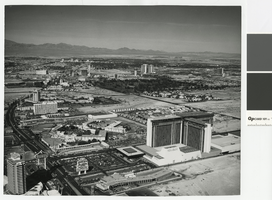
Aerial photograph of the Las Vegas Strip, circa mid 1970s
Date
Archival Collection
Description
Aerial view of the Las Vegas Strip, looking north from the former MGM Grand, since renamed Bally's. Also shown is the former Dunes Hotel, where Bellagio now stands, as well as Caesars Palace, the Flamingo, the Sands, the Frontier, Circus Circus, the Las Vegas Hilton. In the distance is Downtown Las Vegas.
Site Name: Las Vegas Strip
Address: Las Vegas Boulevard, Las Vegas, NV
Image
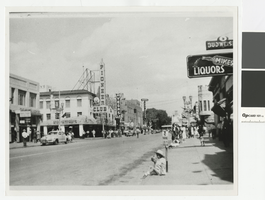
Photograph of businesses on Fremont Street, Las Vegas, Nevada, 1943
Date
Archival Collection
Description
Looking northwest on Fremont Street from between First and Second Streets. Mike's Liquor is at 106 Fremont St. The exterior corner of the Las Vegas Pharmacy at 32 Fremont St. on the corner of First St. is seen. The exteriors of the Pioneer Club, Las Vegas Club and Hotel Sal Sagev are seen on the south side of the street.
Site Name: Fremont Street
Address: Fremont street, Las Vegas, NV
Image
